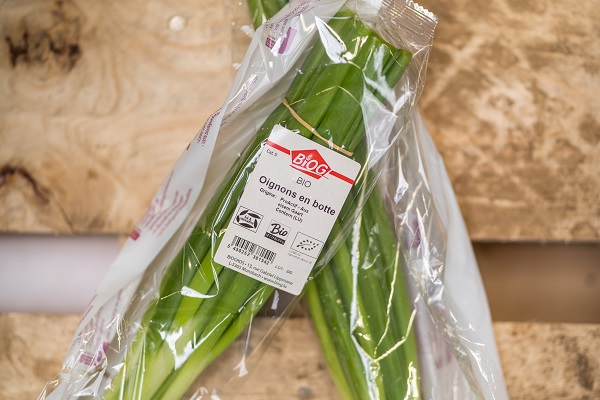
BIOG, the brand of Bio-Bauere Genossenschaft Lëtzebuerg and the organic wholesaler Biogros, founded in 1988, is abandoning plastic for the packaging of its fruits and vegetables in favour of cellulose that is compostable in the garden, therefore 100% biodegradable.
This is a decisive breakthrough for BIOG in the brand's catalog of measurements. Biogros, which packages organic fruits and vegetables under the BIOG brand, has been working since 2008 on alternatives to plastic. Reducing packaging waste and avoiding food waste are goals of the entire Oikopolis group of companies.
Every year, at least 400 million tonnes of plastic are produced worldwide for use, among other things, as packaging material. Not only the large amount of plastic has become a problem, but above all its laborious disposal and recycling.
In general, BIOG only uses necessary packaging. They are best suited to different products and interfere with the environment as little as possible. At the same time, they fulfill their functions of protecting, extending shelf life and neat separation from conventional products in mixed retail, where non-organic products are also offered alongside organic products. It is especially in these cases that it is important to clearly label organic products using printed packaging, allowing consumers to find the organic foods they are looking for without a doubt and without the risk of confusion. For BIOG, reducing packaging waste, on the one hand, and choosing the most environmentally friendly packaging, on the other hand, are important goals that have been pursued from the start and achieved step-by-step.
Cellulose is 100% biodegradable
The fact that BIOG's fruit and vegetable packaging materials are plastic-free is a success the brand has been working on for over 12 years and has been able to achieve step by step through tireless research, testing phases and retraining. The cellulose packaging used by BIOG - produced by a German company - is the first film proven to be 100% biodegradable. The raw material for the production of the film comes from residual wood and waste from certified logging.
The great advantage of cellulose packaging is that it can be composted in composting factories and even “at home” and can therefore be disposed of in bio waste instead of residual waste. Under normal home and garden compost conditions, decomposition takes approximately 42 days. The cellulose used for the packaging of BIOG fruit and vegetables is certified by the German TÜV as "compostable in the home and in the garden". This is currently the highest environmental standard in the world for packaging films. It dissolves in its original natural components during composting, thus forming part of a true natural circular economy preserving resources and the environment.
Towards a plastic-free future since 2008
The wholesaler Biogros has been developing alternatives to plastic for more than ten years. Potential solutions have been tested and the most appropriate have been introduced. In 2008, the company switched from polypropylene (PP) plastic to polylactide (PLA), which was then mainly used for the packaging of fruits, vegetables and leafy salads, such as BIOG lamb's lettuce. PLA is obtained from renewable raw materials, such as corn starch, so it is not derived from petroleum. Unfortunately, this material was only compostable in industrial facilities and under certain conditions.
Today, it is completely replaced by the new cellulose packaging. Moreover, the fillets used, among others for mandarins and lemons, have already been made of cellulose for about 5 years. Likewise, for products not sensitive to humidity, for example fruit varieties such as apples and pears, paper trays replaced plastic several years ago.
Reduction of packaging waste and "Food Waste"
BIOG is primarily interested in the question of when and to what extent packaging can be reduced or replaced. All entrepreneurial considerations of the entire Oikopolis group are based on ecological and economical management of resources, and constant work is carried out to find appropriate solutions to all questions and challenges.
The continued reduction in the weight of packaging materials as well as the replacement of plastic with cardboard, which was carried out last year for many products, can also be added to the list of solutions. In collaboration with suppliers, the packaging managers at Biogros work intensively and relentlessly on improvements, with the aim of reducing the materials used and their integration into a circular economy.
While reducing packaging waste is one side of the coin, avoiding “Food Waste” is the other, just as important. At the same time, the retail business also enjoys an economic benefit in the form of lower rejection rates of many items such as fresh salads, leafy vegetables, etc. So it's a win-win situation for all parties.








